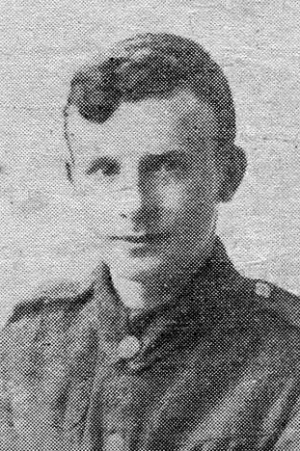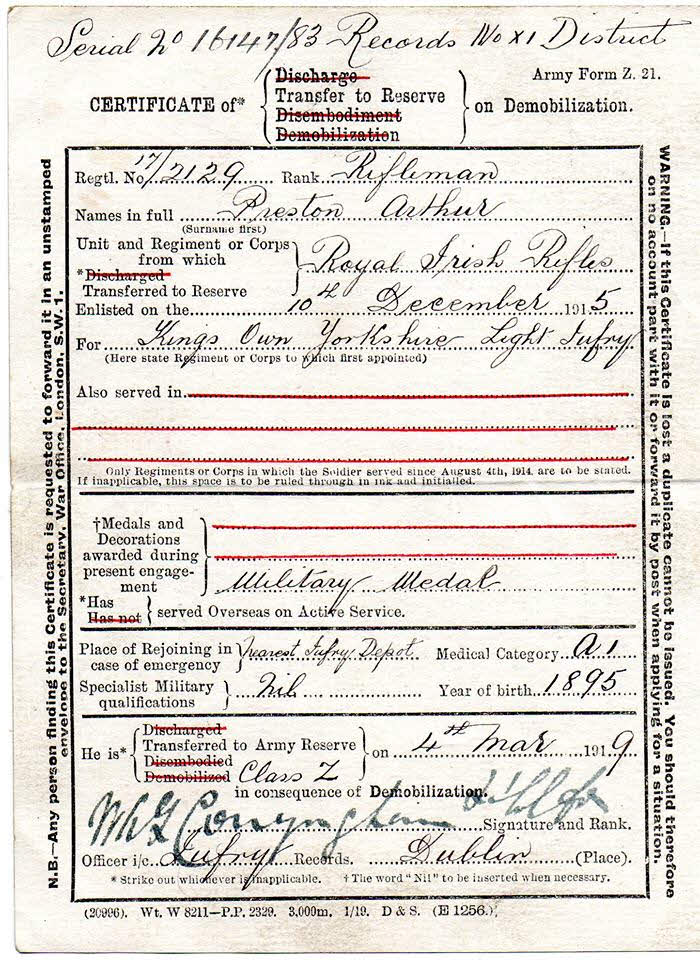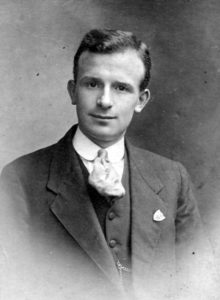
Arthur Preston was born in Gunson’s Row, Ossett on the 10th June 1895, the only son of Thornhill born coal miner Herbert Preston and his wife Clara (nee Holden), who had married at Holy Trinity Church, Ossett on the 2nd May 1893. Arthur had three younger sisters, Hilda Preston (b. 1904), Louie Preston (b. 1911) and Dorothy Preston (b. 12th October 1912) all in the Ossett area.
In 1901, the Preston family were living at Radley Street, South Ossett, but by 1911, they had moved to live at 12, Mitchell’s Row, Dale Street in a cramped, two-roomed house. Arthur, now aged 15 years, was working as an errand boy for a local clothiers business.
We know that Arthur volunteered for service on the 10th December 1915 and that he probably enlisted at Ossett. It is likely that he first joined the King’s Own Yorkshire Light Infantry and later transferred to the Royal Irish Rifles as a rifleman with service number 17/2129. Another Ossett man, Henry Sanderson, who sadly lost his life in 1916, followed a similar career path and Sanderson had the service number 17/2104. It is possible that Arthur Preston and Henry Sanderson were colleagues who joined the Army at the same time.
Arthur Preston sent a letter home dated August 24th 1916 when he was serving in France:
“Rifleman A. Preston, 2129, C Company, 9th Platoon, 11th Battalion, Royal Irish Rifles – Dear Mother, Father and Sisters, I am writing these lines hoping they will find you in the best of health as it leaves me at present. I received the parcel alright it was safe and sound and you can bet I relished the stuff that was in it as it feels a treat to have something from home. I received the parcel on the 23rd inst. How is father and our little Dorothy going? Or is she still merry and bright? I have not yet received the note yet, but as you say I must wait and see if it comes, and as soon as I get it I will write back and let you know. Next time you write put on the letters and parcels the same address that is on this letter and then I think you will not get them sent back, so I think that is all this time.
From your loving son Arthur. With the best of love xxxxxxx”
The 11th Battalion, Royal Irish Rifles was amalgamated with the 13th Battalion to form the 11th/13th Battalion in November 1917 and was disbanded in February 1918 with the troops transferring to the 22nd Entrenching Battalion. Entrenching battalions were temporary units formed in the British Army during the First World War. Allocated at Corps level, they were used as pools of men, from which drafts of replacements could be drawn by conventional infantry battalions. Following the disbandment of the 11th/13th Battalion in February 1918, the pool of men was used to bring the remaining battalions up to strength, and to allocate any remaining manpower surplus to twenty five entrenching battalions. These battalions were put to use in improving the existing defences in anticipation of a German offensive, and could be used as a reserve force if needed. It is not known which Royal Irish Regiment battalion Rifleman Arthur Preston was transferred to prior to the Battle of St. Quintin in March 1918.
The “Ossett Observer” had this report 1 of the award of the Military Medal to Arthur Preston.
“Military Medal Won By Ossett Soldier – ‘I Simply Did My Duty.‘ – Another young Ossett soldier has had the distinction of of winning the Military Medal. He is Rifleman Arthur Preston (22), Royal Irish Rifles, the only son of Mr. and Mrs. Herbert Preston, of 12, Mitchell’s Row, off Dale Street, Ossett. He joined the army under the Derby recruitment scheme, in February 1916, and has had a couple of years’ experience of fighting on the Western front. Among the big battles in which he has taken part are those of Messines, Ypres, Cambrai, St. Quintin, Kemmel, and to use his own words ‘a few more scraps’.
In a recent letter home, Rifleman Preston, referring to the fact that he had not been able to write as regularly as usual, observes: ‘I suppose you have been wondering where I had got to, and have had a few sleepless nights, but I have been in the great battle, and have formed one of the heroic rearguards as Sir Douglas Haig has described us . . . . it was hell upon earth, I can tell you, with machine-gun bullets like rain. But we made the enemy pay a dear price for his advance. They came in massed formation, and we mowed them down like corn, yet it came as if nothing was happening. No mortal man can stand up to 8 to 1 (odds), so we backed steadily, keeping letting rip all the time. I am sorry I cannot say any more about it at present, only I am a lucky man to be here. A lot of my pals have gone west. I can say this much, however, that all the other engagements I have been in were playthings to this. Keep smiling, and look happy, as Fritz has not beaten us yet, and if you take my tip, he will get it in the neck before too long.’
The soldier shows much modesty in announcing to his parents the fact that he has gained the distinguishing honour. Writing a day or two ago he says: ‘ You will be pleased to know that I won the Military Medal during the retreat from St. Quintin. But if anybody asks you what I did to win it, tell them that I did my duty to my King and country. I do no more than any other soldier out here. Dear mother, I want no shouting, but I will take receipt of the ribbon in a few days. Rifleman Preston worked at Westfield Mill.”

Rifleman Arthur Preston won his Military Medal during the retreat by Allied troops from St. Quintin, between the 21st and 23rd March 1918 at the start of the German Spring Offensive. The Kaiserschlacht (Kaiser’s Battle), also known as Operation Michael, was an attempt by the Germans to win the war before the Americans arrived in force on the Western Front and after the Russians had effectively surrendered. This freed up 50 German divisions for service on the Western Front. On the opening day the Germans attacked on a wide front and successfully pushed the Allies back.
On the 21st March 1918, at 0440 hours the Germans launched their heaviest preparatory artillery bombardment yet seen on the Western Front and pounded the British around St Quentin in depth with the forward trenches receiving mustard, chlorine and tear gas thickened by smoke. Then at 0940 hours the Germans attacked using their recently developed “Offensive in Trench Warfare” tactics. Elite infiltrating storm troopers led the assault and the infantry followed, attacking out of an early morning mist made dense by artillery and trench mortar smoke.
Among the Irish infantry of the 36th (Ulster) Division facing the German spring offensive were the 1st, 7th, 8th and 9th Battalion The Royal Inniskilling Fusiliers; the 1st, 2nd, 12th and 15th Battalion The Royal Irish Rifles and the 1st and 9th Battalion The Royal Irish Fusiliers; the 1st Battalion.
The 12th Battalion, Royal Irish Rifles were located in the Forward Zone and the intense enemy artillery barrage cut all communications. The Rifles fought desperately throughout the morning against the German infantry, and the 12th Battalion was effectively annihilated. By the end of the German Spring Offensive, the 36th (Ulster) Division had suffered 7,310 and the 16th (Irish) Division 7,149 casualties; they would be destroyed as effective formations and removed from the British order of battle for reconstruction.
Rifleman Arthur Preston was very lucky to survive. He was awarded the British and Victory Medals after his WW1 service.
 After his WW1 service, Arthur Preston married Emma Grimes (b. 30th November 1894) in March 1927 at St. John’s the Evangelist Church, Hindley Green, Wigan in Lancashire, where she was born. The couple lived at 12, Mitchell’s Row, Ossett, but there appear to be no children from the marriage. In 1939, Arthur Preston was still living with his wife Emma, at Mitchell’s Row, but now working as a boiler firer and steam crane driver.
After his WW1 service, Arthur Preston married Emma Grimes (b. 30th November 1894) in March 1927 at St. John’s the Evangelist Church, Hindley Green, Wigan in Lancashire, where she was born. The couple lived at 12, Mitchell’s Row, Ossett, but there appear to be no children from the marriage. In 1939, Arthur Preston was still living with his wife Emma, at Mitchell’s Row, but now working as a boiler firer and steam crane driver.
Arthur Preston died in the June quarter of 1970 at the age of 74 in Ossett and the “Ossett Observer” had this short obituary:
“Military Medal man dies – An Ossett man who was awarded the Military Medal during the retreat from St. Quintin in the First World War, Mr. Arthur Preston, of 12 Mitchell’s Row, Dale Street, Ossett, died at his home on Sunday. He was 74.
Mr. Preston served with the Royal Irish Rifles and fought in most major battles in the war, including Messines, Ypres, Cambrai and Kemmel.
Before his retirement he had been employed as a crane engineer by British Jeffrey-Diamond, Wakefield. He was a member of the Ossett Trades and Labour W.M.C.
He is survived by a widow and two sisters, Misses Dorothy and Louie Preston of 36, Intake Lane, Ossett.
Cremation was at Dewsbury Moor on Thursday.”
Our thanks to Robert Harrison for the original posting on the “Ossett Through The Ages” Facebook page.
References:
1. “Ossett Observer”, June 1945